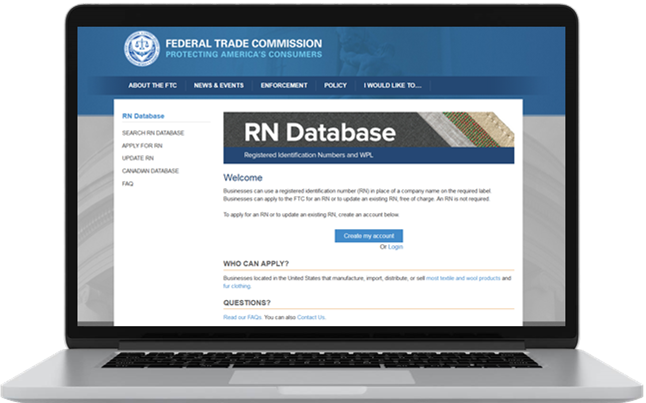It’s not much bigger than a postage stamp, but the label on many textile, wool, and fur products provides important information, including fiber content, country of origin, and a company name or Registered Identification Number (RN). The FTC administers the RN system and industry members will want to check out recent upgrades to the RN website. With RNs and labels on our mind, we asked some common RN-related questions to attorney Josh Millard, whom we’d label as one of the FTC’s go-to people on the subject.
First things first. What’s an RN?
JOSH: A Registered Identification Number (RN) is a numerical designation – the prefix RN followed by a set of digits – that identifies the company responsible for marketing, distributing or otherwise handling a product covered by the Textile, Wool, and Fur Acts. Because some labels are small and some company names are long, the law allows U.S.-based businesses to use an RN as a “shorthand” identification. We think the upgrades to the RN website will make it even easier for businesses to use.
How do I get an RN for my company?
JOSH: Apply online. FTC staff will review your application and email you typically within 1-3 business days. As soon as your application has been approved, you’ll receive your RN.
 How much does it cost to get an RN?
How much does it cost to get an RN?
JOSH: There’s no charge.
Is it mandatory that companies use an RN on labels?
JOSH: No, you don’t have to use an RN. It’s perfectly acceptable to include your company name instead, but many companies prefer to use an RN because it takes up less space. The RN system has other benefits, too. For example, it lets people identify your business easily through the RN Search screen. Consumers or other industry members can type in the number and readily find your business.
Our company doesn’t reside in the United States. Can we get an RN?
JOSH: Only U.S.-based businesses can get an RN. If your foreign company manufactures or is involved in the advertising, distribution, or sale of a product covered by the Textile, Wool, and Fur Acts, put the company name on the label instead of an RN. Alternatively, you can label the product with the RN or business name of a U.S. company directly involved with importing, distributing, or selling the product when that’s the case.
Going through our records we found we have multiple RNs. Is that a problem?
JOSH: It’s not prohibited, but we no longer issue multiple RNs to a single company and encourage companies to cancel any extra RNs to simplify recordkeeping.
Our headquarters has moved since we applied for an RN. Do we need to update our application?
JOSH: Yes. If there has been a change to your business name, address, or legal status, please update the information in your RN registration. An RN can be cancelled if a business doesn’t keep its information up to date, so it’s wise to check. The good news is that the upgraded RN website makes that easier to do.
What if we choose to use a company name on the label, rather than an RN?
JOSH: You must include the full name your company uses to do business – in other words, the name that appears on documents like purchase orders or invoices. It can’t be a trademark, trade name, brand, or designer name unless that’s also the name under which your company does business.
What kind of guidance does the FTC have for industry members?
JOSH: Threading Your Way Through the Labeling Requirements Under the Textile and Wool Acts is a great place to start, and the FTC’s Clothing and Textiles page includes links to brochures, cases, workshops and other compliance resources.
